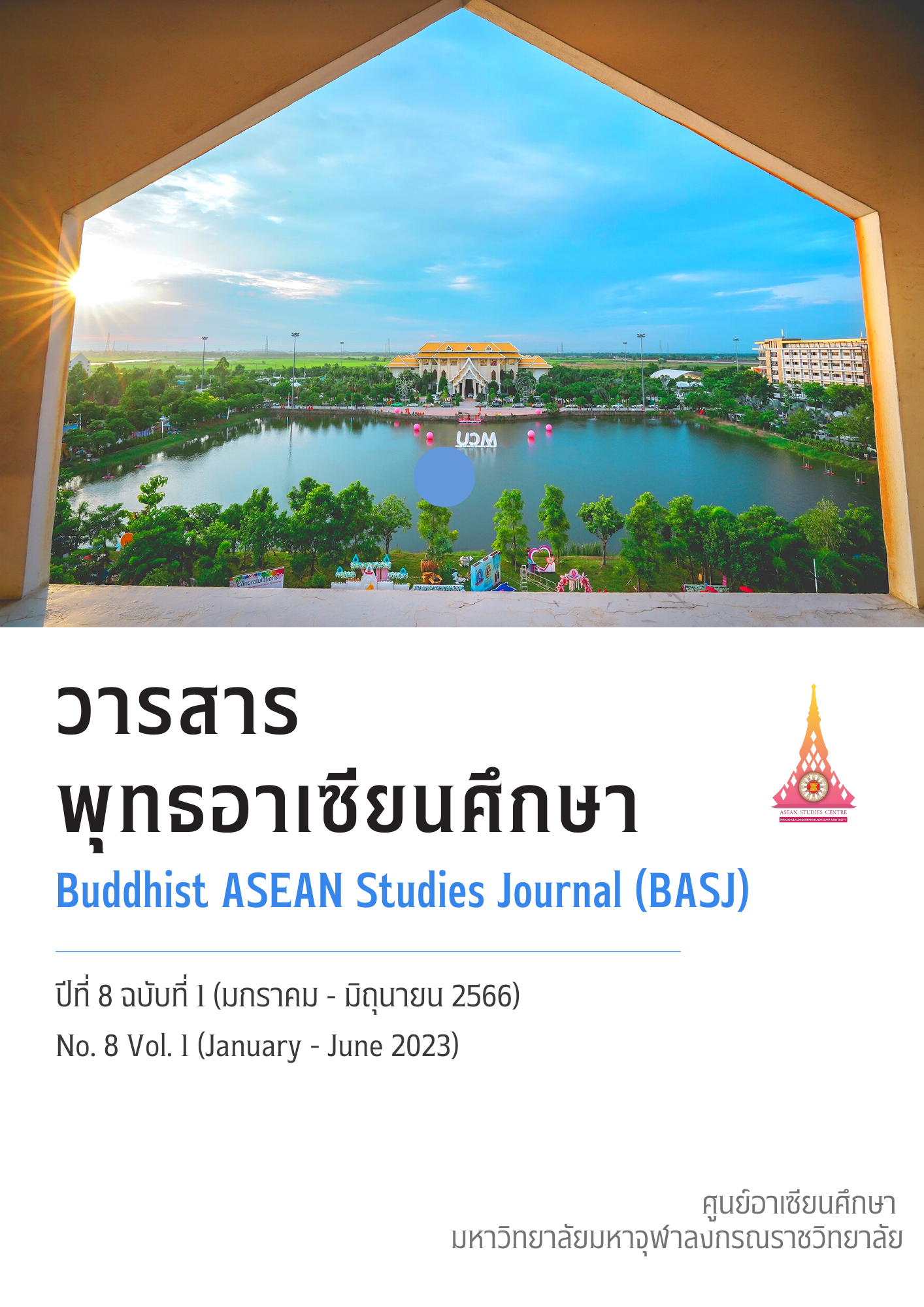Motivation in reading English according to Buddhist principles of Yang Hom Wittayakhom School students At the lower secondary level
Keywords:
motivation, reading English, Buddhist principlesAbstract
Research study Motivation in English Reading according to Buddhist Principles of Yang Hom Wittayakhom School Students at the Lower Secondary Level Its objectives are: 1.) To study problems in motivating reading in English; 2.) to develop motivating factors for reading English; 3.) to present guidelines for motivating reading in English This research is qualitative research. The samples are 30 person high school students The research instruments consisted of English reading chapters, Questionnaire, and Interview.
The results showed that students had difficulties and difficulties in reading English due to lack of motivation to practice and lack of self-confidence and insolence. If introducing Buddhist principles such as the Fourth Baht principle to strengthen the motive in reading English Will enable confident reading in English And able to develop better reading skills in English It also provides students with a motivating way to read English. To be successful in reading English effectively
References
จิรา จันทร์ทอง. (2553). การบูรณาการเทคนิคการตั้งคำถามและการอ่านแบบกว้างขวางเพื่อส่งเสริมความเข้าใจในการอ่านภาษาอังกฤษและนิสัยรักการอ่าน. (วิทยานิพนธ์ศิลปศาสตร มหาบัณฑิต). มหาวิทยาลัยสงขลานครินทร์.
จิราภรณ์ ผดุง และนิสากร จารุมณี. (2554). การใช้กิจกรรมแบบหลากหลายเพื่อส่งเสริม นิสัยรักการอ่าน. วารสารศิลปศาสตร์ มหาวิทยาลัยสงขลานครินทร์. 3(1), 71-91.
ธนภณ สมหวัง. (11 มกราคม 2543). พุทธธรรม: คู่มือมนุษย์ศตวรรษที่ 21.หนังสือพิมพ์มติชนรายวัน, 8
นทีธร นาคพรหม และคณะ. การสำรวจปัญหาการอ่านภาษาอังกฤษของนักศึกษา คณะครุศาสตร์ สาขาวิชาภาษาชั้นปีที่ 4 มหาวิทยาลัยราชภัฏเพชรบูรณ์. เครือข่ายบัณฑิตศึกษา และการประชุมวิชาการระดับชาติ ครั้งที่ 3. มหาวิทยาลัยราชภัฏเพชรบูรณ์
พระพรหมคุณากรณ์ (ป.อ.ปยุตฺโต). (2544). พุทธธรรม (พิมพ์ครั้งที่ 15).กรุงเทพฯ : มหาวิทยาลัยเกษตรศาสตร์ ชมรม มก. อาวุโส
_________________________ . (2547). รู้หลักก่อนแล้วศึกษาให้ได้ผล. กรุงเทพฯ : สำนักงานคณะกรรมการศึกษาขั้นพื้นฐาน.
เพลินพิศ วิบูลย์กุล ฝ่ายแผนงาน ส่วนแผนงานและส่งเสริมความรู้. แรงจูงใจ Motives การจูงใจ Motivation. สืบค้นเมื่อ 20 พฤศจิกายน 2564 จาก http://www.novabizz.com/NovaAce/Motives.htm#ixzz3aB9G8Gfh.
รักการอ่านนำชีวิตสู่ความสำเร็จ. สืบค้นเมื่อ 20 พฤศจิกายน 2564 จาก
http://www.moe.go.th/moe/upload/hotnews/htMisfiles/10504-5320html.
วิไลรัตน์ คิรินทร์ และ ปัญชลี วาสนสมสิทธิ์. (2553). การศึกษาเปรียบเทียบความสามารถและแรงจูงใจในการอ่านของนักศึกษาปริญญาตรี ที่อ่านหนังสือในปริมาณสูงและต่ำ. วารสารมนุษยศาสตร์ มหาวิทยาลัยนเรศวร. 7, 85-97.
วิสาข์ จัติวัต์. (2543). การสอนอ่านภาษาอังกฤษ (Teaching English Reading Comprehension) (พิมพ์ครั้งที่ 2). นครปฐม : คณะศึกษาศาสตร์ มหาวิทยาลัยศิลปากร
หลักพุทธธรรม นำไปสู่ความสำเร็จ. สืบค้นเมื่อ 20 พฤศจิกายน 2564 จาก https://moneyhub.in.th/article/precept-of-buddhism/
สุนันทา มั่นเศรษฐวิทย์. (2540). หลักและวิธีการสอนอ่านภาษาไทย. กรุงเทพฯ: สํานักพิมพ์ไทยวัฒนาพาณิช.
สํานักวิชาการและมาตรฐานการศึกษา. (2551). ตัวชี้วัดและสาระการเรียนรูแกนกลาง กลุมสาระการเรียนรูภาษาตางประเทศ ตามหลักสูตรแกนกลางการศึกษาขั้นพื้นฐาน พุทธศักราช 2551. กรุงเทพฯ : สํานักงานคณะกรรมการการศึกษาขั้นพื้นฐาน กระทรวงศึกษาธิการ.
สุภาคย์ อินทองคง. (2550). การใช้หลักพุทธธรรมนำการวิจัยและพัฒนาตามปรัชญาเศรษฐกิจพอเพียงสู่สุขภาพองค์รวม. ม.ป.ท. : ศูนย์เรียนรู้ชุมชนภาคใต้ (ศรช.)
อมฤตา โอมณี และนิสากร จารุมณี. (2559). การใช้วิธีการอ่านแบบกว้างขวางในการพัฒนาสมรรถนะการอ่านภาษาอังกฤษและความสามารถในการคิดอย่างมีวิจารณญาณ. วารสารศิลปะศาสตร์ มหาวิทยาลัยสงขลานครินทร์ วิทยาเขตหาดใหญ่, 8(2), 104 - 131.
อมรรัตน์ ชำนาญรักษา. ความหมายของการอ่าน. สืบค้นเมื่อ 20 พฤศจิกายน 2564 จาก https://sites.google.com/site/madoobook/home/khwam-hmay-khxng-kar-xan.
Anderson, R.C. (1984). A Schema-Thematic View of Basic Processes in Reading Comprehension. In Handbook of Reading Research, 258-272. New York: Longman.
Chang, C-S. & Renandya, W.A. (2017). Current practice of extensive reading in Asia: Teachers’ perception. The Reading Matrix: An International Online Journal, 17, 1-16.
Leu, Donald J. and Charles K Kinzer. (1995). Effective Reading Instruction. 3rd Ed. New York: A Simon and Schuster Company.
Mikami, A. (2017). Students’ attitudes toward extensive reading in the Japanese EFL context. TESOL Journal, 8(2), 471-480.
Morgado, F. & Nelly (2009). Extensive Reading: Students’’ Performance and Perception. An International Online Journal, 9, 15.
Yamashita, J. (2004). Reading Attitudes in L1 and L2, and Their Influence on L2 Extensive Reading. Reading in a Foreign Language, 16, 1-19. Retrieved on 24 November 2021 from http://nflrc.hawaii.edu.rfl/.
Downloads
Published
How to Cite
Issue
Section
Categories
License
Copyright (c) 2023 Buddhist ASEAN Studies Journal

This work is licensed under a Creative Commons Attribution-NonCommercial-NoDerivatives 4.0 International License.



